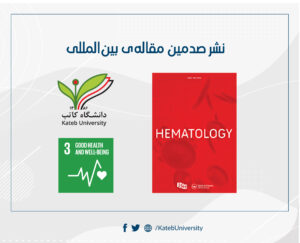The article entitled “Transfusion-dependent beta-thalassemia in Afghanistan: current evidence amid COVID-19 and future recommendations” was published in an ISI and prestigious journal of “Hematology” which is part of the Official Journal of the International Society of Hematology from the publication of Taylor & Francis.
In this scientific article, Dr. Sayed Hamid Mousavi, Head of Kateb Research Center, was the main executor of this project, and two elite students of Kateb University each Ms. Shamim Arif and Shekiba Madadi collaborated in this research.
This article discusses the challenges of severe beta-thalassemia patients in Afghanistan during the Covid-19 pandemic. In this article, in addition to examining the challenges of these patients, good suggestions and strategies to increase the quality of life and health services for thalassemia patients are presented.
The summary of this article is as below:
Afghanistan, as a developing country, faces many problems in the health system throughout the country. One of the biggest problems is providing adequate and quality health care to patients with severe beta-thalassemia who are dependent on blood transfusions (TDT). These patients face the following challenges.
1. Lack of government and private sector investment to meet the needs of these patients;
2. Lack of accurate information on the number of these patients in the country;
3. Lack of necessary facilities for prevention, diagnosis, and treatment throughout the country;
4. Extremely high costs for improving the quality of life of a thalassemia patient (bone marrow transplant is very expensive and unavailable).
5. Lack of access to premarital and prenatal diagnostic centers for these patients;
6. Illiteracy is one of the main problems in most of these patients that prevent treatment.
7. Gender and traditional beliefs prevent women from attending in time for prevention, diagnosis, and treatment.
8. Blood-borne infections are one of the biggest challenges for these patients due to the lack of standard screening of blood donors.
9. During the Covid-19 pandemic, problems such as transportation restrictions, drug shortages, quarantine, the incidence of Covid-19 specialists, and the reduction of the blood donation campaign were among the other most important problems during this period.
Also, in this article, some suitable suggestions have been suggested to improve the quality of life of these patients.
1. Conduct further research to provide evidence-based findings;
2. Awareness of premarital and prenatal testing;
3. Increasing the number of specialists to provide preventive, diagnostic, and treatment services;
4. Establish a comprehensive system for patient registration;
5. Cooperation between the government and national and international NGOs to provide medicine and healthy blood;
6. Conducting standard blood tests of donors to prevent the transmission of blood-borne infections;
7. During Covid-19 pandemic, prioritizing vaccination of these patients;
Interested people can find the article here.
#SDG_3
#Health_and_WellBeing

Sharing: